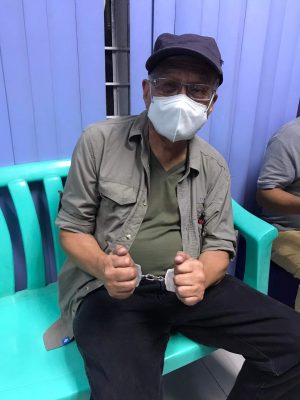Police in the Philippines have arrested left-wing activist and former senator Walden Bello on cyber-libel charges, offering a sobering indication of the political climate under the young administration of President Ferdinand Marcos Jr.
According to a report by Rappler, the warrant for Bello’s arrest was issued yesterday by a judge at a court in Davao City, where Vice President Sara Duterte-Carpio previously served as mayor.
In a Facebook post yesterday, Bello announced his arrest, accompanied by a photo of himself in face mask and handcuffs, saying that he would have to spend the night in jail “since it’s too late to post bail.” Bello, who ran against Duterte-Carpio for the vice presidency in the May 9 election, described the arrest as a case of “pure political harassment and persecution,” adding, “no way I will let these people intimidate me and suppress free speech.”
The charge stems from a cyber libel case filed against Bello in March by former Davao City Information Officer Jefry Tupas, who worked under Vice President Sara Duterte-Carpio during her time in charge of the city.
In November, Duterte-Carpio announced that Tupas had been fired after she was found to have attended a birthday party where authorities seized about 1.5 million Philippine pesos worth of illegal drugs and arrested 17 people during a raid. The following March, Tupas filed a cyber libel complaint seeking P10 million in damages from Bello, for a Facebook post in which he criticized Duterte-Carpio for skipping a vice presidential debate, accusing her of “sheltering a drug dealer.”
Tupas said that the comments had “maligned, injured, and defamed me and exposed my good reputation to public hatred, contempt, discredit, and public ridicule.” Bello dismissed it as “clearly a politically-motivated move” and said it was a “smokescreen” designed to cover Duterte-Carpio’s “cowardice” to join debates during the election campaign.
Bello has been one of the most prominent critics of President Rodrigo Duterte, Sara’s father and predecessor as mayor of Davao City, and Ferdinand Marcos Jr., to say nothing of the Marcos dynasty writ large. The day after the election, which saw both Marcos and Duterte-Carpio score landslide victories, Bello put out a statement bearing the title “FUCK YOU MARCOS. THE BATTLE HAS JUST BEGUN.” In the statement, he described the new president and vice president as “an axis of evil,” and described the Marcos clan as a “family of thieves.”
Many progressive groups and personalities, including labor leader Leody de Guzman, who ran with Bello in the presidential election, have condemned his arrest and demanded his release.
Charles Santiago, a Malaysian parliamentarian who chairs the advocacy group ASEAN Parliamentarians for Human Rights (APHR), described Bello “one of the most prominent critics of the Duterte administration,” and said that the charges “epitomize the constant assault against the opposition, which has been constantly attacked through red-tagging and narco-tagging.” The latter refer to situations in which government officials impute ties between their critics and communist groups or drug traffickers in order to delegitimize them or open them up to
Santiago added that the case was another example of the way that the Philippines’ cyber-libel laws “has been repeatedly used as a political weapon to persecute government critics and opposition voices in the Philippines.” The Duterte administration also used the law against Maria Ressa, the co-founder of the news site Rappler, who was jointly awarded last year’s Nobel Peace Prize.
Bello’s arrest indicates that the presidency of Ferdinand Marcos Jr., who took office on June 30, is unlikely to mark any real improvement on questions of fundamental rights. The arrest took place just days after U.S. Secretary of State Antony Blinken visited the Philippines, during which he assured Marcos that Washington would come to Manila’s defense if attacked in the South China Sea.
Values did not feature high on Blinken’s agenda – and perhaps just as well, given the fact that a reinvigoration of the U.S.-Philippine alliance as an anti-China bulwark will undermine the Biden administration’s fondness for framing its strategic tensions with China and Russia as a pristine showdown of democracies and autocracies. The fact that the arrest would take place so soon after Blinken’s departure is a sure sign that the Philippines’ new administration will chart its own illiberal course, whatever the tone of the rhetoric emanating from Washington, D.C.

































